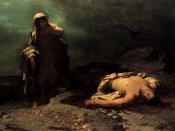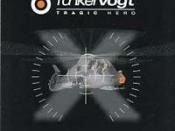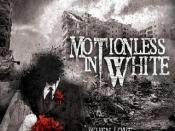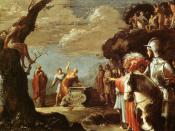who is the true tragic hero in Sophocles' play Antigone? Antigone: The Battle for Tragic HeroFor centuries the Greek tragedy, Antigone, has had the argument over who is the true tragic hero of the play. Unlike the first tragedy of the series, Oedipus the King, there is no obvious choice for this position. Both Antigone and Creon are from noble families, are respected members in the city of Thebes and both seem to make just decisions, but the question is which has all of the other traits a tragic hero requires? Aristotle told us in his book, The Poetics, that a tragic hero also obtain pity and fear from audience, have a hamartia (error in judgment), and go through anagnorisis (a revelation). In terms of Aristotle, Creon is the true tragic hero, having all of the characteristics necessary to be qualified for the position, unlike Antigone.
Hamartias can be found in both of the characters battling for the position of tragic hero, Creon and Antigone. Like his brother-in-law and nephew, Oedipus, Creon is found to have extreme hubris as his tragic flaw, showing complete pride in himself and all of the decisions he makes throughout the play. Even at the beginning when his own son is trying to tell him what he has done wrong, he does not listen for he feels his decisions are justified and thoroughly correct, in his mind at least. Haemon begins to tell him that the citizens of the city do not all stand behind him on the decisions he has made causing Creon to get overly offended. "The city is the king's-that's the law!" Creon shouts at his son, who is not only trying to point out his father's faults, but also trying to save his bride from death (Sophocles 825). Whilst the father and son are arguing, Haemon also points out that his father has put man's law above the god's law by not allowing Polynices to have a burial, that he has "trample[d] down the honors of the gods"(835). Even at the end after Tiresias, the blind prophet, tells him that he has made a mistake he Creon turns to the chorus and says "Lay my pride bare to the blows of ruin?/ That's too dreadful" (1221). Pride has made the king put himself above the people of the town, the Chorus, and even the god's themselves. Creon's hubris dominates entire sections of the play whereas the hamartia of Antigone is not so extreme. The play starts with Antigone seeming as if she is breaking man's law to follow a higher law-god's law, but we see when she is being taken to death that that is not how it truly is.
Never, I tell you.
If I had been the mother of childrenor if my husband died, exposed and rotting-I'd never have taken this ordeal upon myself,never defied our people's will. What law,you ask, do I satisfy with what I say?A husband dead, there might have been another.
A child by another too, if I had lost the first.
But mother and father both lost in the halls of Death,no brother could ever spring to light again (995-1005).
She would never break man's law for anyone in her family that could be replaced, but for her brother, Polynices, she had to bury him. The blind loyalty and pride she has for the Royal House of Cadmus compels her to commit the crime. This loyalty is her hamartia. Although Antigone does have a hamaritia Creon's is present throughout the entire span of the play and the type of hamartia matches that of the previous tragic hero in this play series, Oedipus.
After thinking about the what the prophet revealed, Creon starts to realize the mistakes he has made. "No more fighting a losing battle with necessity"(1231). He sees that he was too proud and tries to make his wrongs right by freeing Antigone from her "bridal chamber where all are laid to rest" (900). Finding out about the death of his son, wife and Antigone he then undergoes complete anagnorisis.
Look at us, the killer, the killed,father and son, the same blood-the misery!My plans, my mad fanatic heart,my son, cut off so young!Ai, dead, lost to the world,not through your stupidity, no, my own( 1395-1400).
Creon takes the responsibility for what his actions caused, realizing it was his pride who drove his wife, son and Antigone to suicide. This is one of the major flaws in categorizing Antigone as the tragic hero, she has no anagnorisis. The last words we hear from Antigone are "I alone, see what I suffer now/ at the hands of what breed of men- / all for reverence, my reverence for the gods!" (1030). She goes to her death still trying to convince the people that she did this in honor of the gods without ever realizing that she was wanting to bury her brother for the wrong reason. Never going through the revelation that a true tragic hero must makes her unqualified to fit such a title.
The only flaw of Creon being the tragic hero is the fact that he does not obtain as much pity from the audience as Antigone. Throughout the play the audience sides with Antigone, while still understanding the point of view of Creon, feeling great pity for her and her pre-determined fate. "Die I must, I've known it all my life-/ how cold I keep from knowing?-even without/ your death-sentence ringing in my ears". Lines such as these caused emotion to flood through the audience, leaving them feeling great pity for the girl about to face her death. Although Antigone sparked sympathy from the audience, Creon did not do such until the end when he had already gone through his anagnorisis. The audience feels when Creon loses his son and wife. They agonize with him as he realizes to the full extent that the deaths are the effects of his extreme hubris.
Creon is the tragic hero of this play, having all of the qualifications needed to be a tragic hero. There really is not a question of who receives the title because after seeing that Antigone does not go through all the steps a true tragic hero is required to go through, it is obvious that the battle of tragic hero must be won by Creon.
Bibliography:Antigone by Sophocles.
The Poetics by Aristotle.





